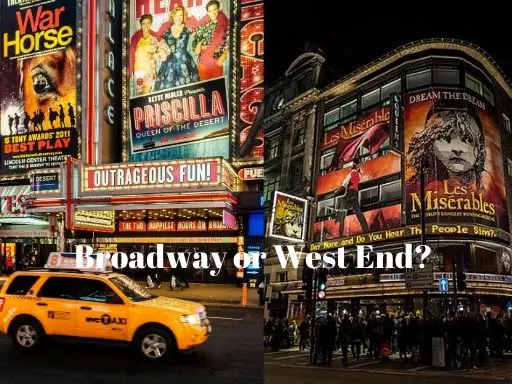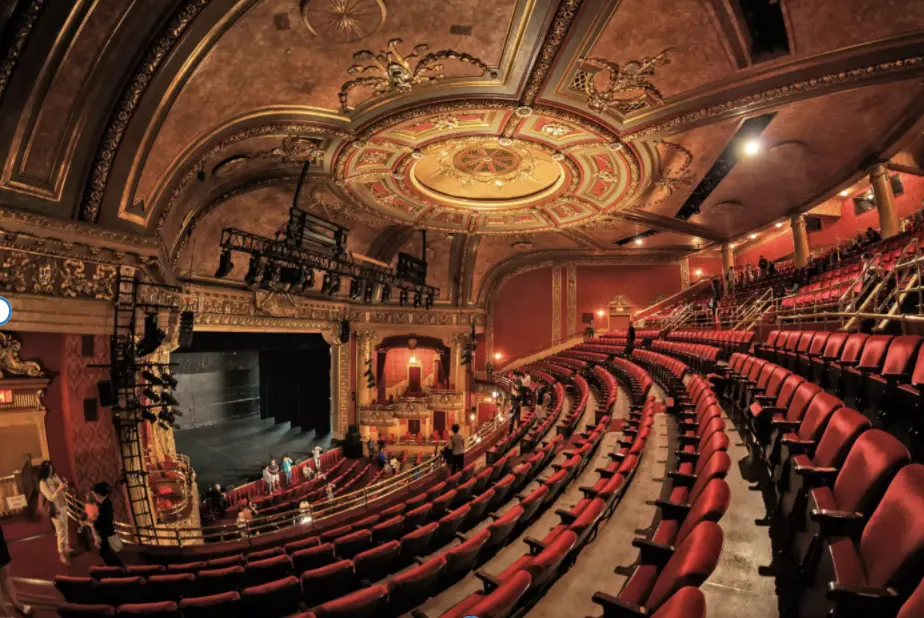
There are specific Differences between Broadway and West End for actors and an audience point of view. From acting contracts, to warms ups, call times, pay rates, to cultural specifics. Both districts have huge diversity and are held in busy parts of major cities London and New York respectively. Both districts are considered to be the best performing arts hubs in the world.
Both the West End and Broadway are the best dramatic venues in their separate nations, NYC in the US and London in England. Both centres have about 40 theaters in their midst, showing plays, and musical theater.
Likewise, the pay rates, contracts and ticket prices reflect the expert degree of specialty and talent, which is of the highest and professional standards. So ticket prices and locations of theaters match the degree of talent and expertise in the show.
A popular play or musical that has acclaim and success in one city will open again in the other city or location. In many cases the two shows of the same production will in both run at the same time.
You can see Phantom of the Opera either on Broadway or in the West End at the same time. Both were coordinated by the same director, Harold Ruler and both have been running for quite a long time to huge acclaim and success.
There are a few points of difference, there seem to be more ‘plays’ in London compared with Broadway. There is likewise more experimentation and edgy productions in West End, but this is also matched with Off Broadway productions in New York.
Broadway recently has more musicals and all the more family friendly shows. Ticket costs on Broadway are somewhat higher. On the Westend they seem to have more discounts for students and senior citizens.
The venues are about similar size with a couple of exemptions. There are cultural and social contrasts to the cities.. Be that as it may, those distinctions aren’t important to the high standards of both Broadway and the West End.
Contracts and Agreements for Actors in Broadway and the West End
There are a few different agreements or contracts on Broadway. They have the Principal Contract, (White Contract) which is a term contract, similar to the contracts at the Westend.
They’re generally one year for brand new show, and a half year for replacement shows. Now and then if there’s a “star” coming in, the contract is generally more limited. (Somewhere in the range of about fourteen days to several months, contingent upon their ability to be available for the show). These contracts require you to work the full term, despite the fact that they are not difficult to exit from.
At that point you have the Chorus Contract (Pink Contract). This is a run of the play contract. The entertainer can leave the show whenever, with a four to six week notice, contingent upon the particulars of the contract. Nonetheless, the producer can take an entertainer from the show for “just cause” if it suits their agenda.
Cases like these require consultation with Equity and regardless of whether they win, they typically end up paying a fee to the entertainer or actor as a buy out fee. Keep in mind that a producer can exclude an actor for any reason they see fit.
Audience Etiquette in Broadway and West End
Generally, in Broadway, audiences are more extroverted in their praise of the show they have just seen, often using standing ovations to show their pleasure.
In contrast the English audiences tend to be more reserved and using standing ovations sporadically or when a master production has hit their theatres and the talent expectations.
Half Time Goods at Broadway and the West End
During the show of Mama Mia, patrons are offered ice cream and bubbly which is typical of a Westend production. At Broadway with the same show, it is unlikely that the audience will be offered the same sweet treats.
Inf act in Broadway, it isn’t exactly frowned upon to eat in a theatre compared with the more reserved West End theatres.
Theater Programs Differences in Broadway and the West End
In Broadway an audience member will receive a Playbill which explains the production and showcases the actors, director and crew. Often the Playbill which also highlight other shows happening at the same time. It’s good advertising.
In the West End you have to buy a program or programme which is can be okay to very shiny and slick quality. You tend to get what you pay for.
Theatre Room in Seating in Broadway and West End Theaters
In the West End some older theatres have smaller seating room compared with the more modern or later theaters built in New York. Theatre seats upstairs especially in the Gods are especially small, which generally cater for the patron who is on a budget. Broadway offers more roomy seating in general.
Some people even say that the Westend theaters on the whole are much more regal and beautiful than the Broadway theaters. In Broadway there is more of an emphasis on the show itself rather than the theater and show as many Westend theaters have.
The West End district enjoys lighter weight musicals (jukebox shows and shows that appear to exist exclusively for hen parties) over Broadway however progressively they appear to have more of a balance in Broadway.
Getting Tickets for West End and Broadway Shows
In the West End, half-price and cheap tickets can be found for virtually any show at the Leicester Square booth, with the exception of the National Theatre, which does not sell there Personally, The major theatres are easy to walk across, despite the fact that the National is on the opposite bank.
In New York the Theater district is spread out a little more. You can get tickets from Time Square ticket booths especially the cheaper tickets. You can also purchase tickets to most Broadway shows online at Telecharge, Ticketmaster, PlayBill or TheaterMania.
Many audience members have made comments that tickets are usually much less expensive in the Westend compared with tickets on Broadway.
There are also other ways to acquire tickets too with the West End. Many people feel as though the Westend offers a great night out where you can dress in your cocktails dresses and ties and not feel overdressed.
With The Royal Opera House, The Vic, The London Coliseum, Barbican to even The Globe Theater, London or the Westend offer the most spectacular experiences for the audience to view shows. Check out this link for more information.

However Broadway do offer some beautiful theaters as well. This particular theater rivals any of the Westend theaters. It is simply stunning and very regal looking. The seats are velvet and the fillergry on the roof is beautiful.
Oh and in the Westend there is The Theatre Royal which has one of the longest running shows on stage, ‘The Mousetrap.’ The Mousetrap was a superb performance and one which should not be missed.
Of course the theater styles suit different tastes, but both Broadway and the West End have spectacular modern and traditional looking theaters.
They call the orchestra seats the stalls in the West End. So depending on which country you come from is what you are used to.
On Broadway it seems to be more of a casual feel. Having said that (author) having experiences with both Broadway and the Westend I loved both experiences no matter how casual or dressed up everyone was.
Although attendance at West end is higher, Broadway brings in more revenue per audience member. Prices in general are higher on Broadway than on the West End. Tickets for the West End are almost half of the price of tickets on Broadway.
By definition, Broadway theaters should have a minimum of five hundred seats and be between seventh and eighth Avenue and 40th and 54th Street. They host principally plays and musicals, although occasionally they host concerts and dance shows These theaters are often eligible for the Tony Awards. Some examples of Broadway locations theaters are the Vivian Beaumont Theatre, Hudson Theatre, and Samuel J. Milton Friedman Theatre.
Off Broadway theaters must have at least 100 to 499 seats and must be in New York City. Many smaller productions are mounted in these smaller venues with great success. Off Broadway shows began as a way to combat over-commercialisation of mainstream theater. It has since taken on a life of its own.
The Difference between Warm Ups in Broadway and the West End for Performers
In the West End it is compulsory for performers to warm up as a group or an ensemble on stage before they get on and perform. Usually there is a 7:30 show start, the warm up will be at 6pm.
Warm ups usually consist of body movements, stretches, and voice exercises. If it is a musical production, warm ups either acapella as a group or with a piano is often had. But this is usually compulsory compared with actors and performers on Broadway.
Performers on Broadway are allowed to do their own individual warm ups as they see fit. This can either be with each other as an ensemble or by themselves, usually on stage or in a quiet room.
Broadway productions usually get ten hours of rehearsal time per week in addition to eight shows without going into overtime. Producers generally prefer to use that time to re-work scenes, clean up glaring issues and put in rehearsals for replacements, not warmups.
Both London and New York are Expensive Cities to Live
In light of the expense of lease, New York City isn’t more costly than London. On Broadway, the lowest paid performer or actor usually makes more than $100,000 each year, so obviously rivalry for those positions is high! Apartments are expensive, but pay rates tend to reflect the living costs associated with the location.
Musicals are incredibly competitive and fierce to get in. There are a huge amount of exceptionally prepared, talented, energetic entertainers attempting to chip away at Broadway. However in general Westend performers are paid less than their Broadway counterparts.
In a Nutshell
Both Broadway and the West End productions offer their theater going audiences a slick, professional and high standard performances. Without a doubt the best performers and performances in the world are showcased in these two cities.
There are differences in ticket prices, venues quality, audience responses and even to etiquette. Actors in both cities have differences in the type of contracts and unions they belong to. But all in all if you are lucky enough to get to a performance in either one or both of these locations, you are in for a fabulous treat.